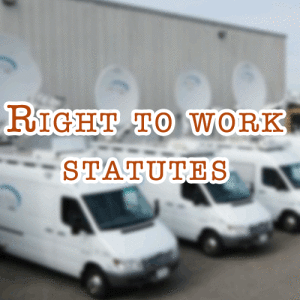Misconceptions: Why “right-to-work” may not apply to you
Having worked at three different television stations (none of which was unionized), I frequently heard how non-compete provisions (restrictive covenants) should not be enforceable in specific instances, because “this is a right-to-work state.” I still hear the expression from media-employed friends who perceive themselves to be aggrieved by their employers; they lean on their state’s “right to work” statute as a source of perceived bargaining strength. Employees in myriad industries believe that these statutes protect them from being kept out of the market by their employers after separation. In fact, this phrase is widely and woefully misused by many, particularly those in the media.
The phrase “right-to-work” is linked to labor laws that have changed, by state, as the specter of the “closed” union shop has faded. More plainly put, it is a union concept. If you do not work for a company that has union agreements, “right-to-work” does nothing for you.
For those interested in the meaning of the phrase, and for the many print journalists who are somewhat more commonly unionized, there was a time (pre-1947) when employers and unions were allowed to require union membership as a condition of employment. When employers established these requirements, they were called “closed” shops. The Taft Hartley Act did away with the closed shop in 1947. The Act freed the states however, to permit less restrictive versions of these shops, like the agency shop, where employees have to pay union dues even when they do not join the union, simply as a condition of employment.
Generally speaking, a right-to-work law allows employees to work for a company without having to have anything to do with its affiliated unions. More than two dozen states have right-to-work laws, including Tennessee, Mississippi and Arkansas. By way of example, here are a few of Tennessee’s right-to-work statutes. Tennessee makes it a Class A misdemeanor to violate these statutes.
§ 50-1-201. Denial of employment because of affiliation or nonaffiliation with labor union.
It is unlawful for any person, firm, corporation or association of any kind to deny or attempt to deny employment to any person by reason of such person’s membership in, affiliation with, resignation from, or refusal to join or affiliate with any labor union or employee organization of any kind. (Enacted 1947.)
§ 50-1-202. Contracting for exclusion from employment because of affiliation or nonaffiliation with labor union.
It is unlawful for any person, firm, corporation or association of any kind to enter into any contract, combination or agreement, written or oral, providing for exclusion from employment of any person because of membership in, affiliation with, resignation from, or refusal to join or affiliate with any labor union or employee organization of any kind. (Enacted 1947.)
§ 50-1-203. Exclusion from employment for payment of or failure to pay union dues.
It is unlawful for any person, firm, corporation or association of any kind to exclude from employment any person by reason of such person’s payment of or failure to pay dues, fees, assessments, or other charges to any labor union or employee organization of any kind. (Enacted 1947.)
In other words, in Tennessee, it is unlawful for an employer to not employ you because you are not affiliated with a union. They also cannot require you to pay union fees as a condition of employment (agency shop).

